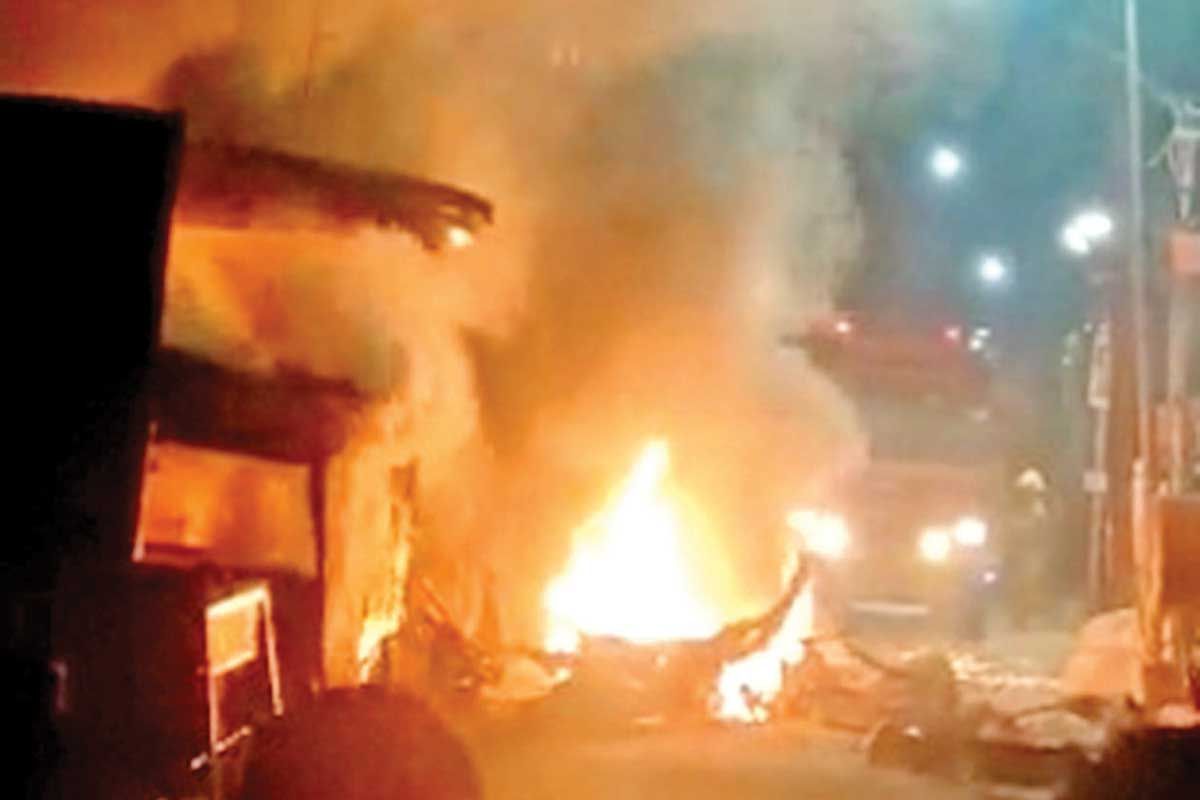Manipur Authorities on High Alert After Bomb Attack on Transport Minister’s Residence
The northeastern Indian state of Manipur is once again grappling with heightened security concerns after a recent bomb attack at the residence of Transport Minister Khashim Vashum. The attack occurred on Saturday night in Ukhrul District, and although no casualties were reported, the explosion caused damage to the property. An extensive search operation was launched by security forces, including Ukhrul Police, Assam Rifles, and other agencies, to apprehend the suspects. This incident highlights the growing concerns over security in Manipur.
Summary of Recent Events
In a shocking development, the residence of Manipur’s Transport Minister, Khashim Vashum, was targeted in a bomb attack in Ukhrul District. The incident, which occurred near the Mini-Secretariat in Ukhrul, did not result in any human casualties but did cause property damage. A coordinated response from various security agencies followed, but no arrests have been made. Investigations are ongoing as the authorities seek to maintain peace in the region, which has been vulnerable to insurgent activities and violent protests.
Deep Dive: The Rising Security Concerns in Manipur
Manipur, nestled in the northeastern corner of India, has long faced its share of security challenges, ranging from insurgent activities to ethnic tensions. The bomb attack on the residence of Transport Minister Khashim Vashum is the latest in a series of violent incidents, sending shockwaves through the region. But this attack represents more than just a singular act of violence—it is a reflection of deeper, unresolved issues within Manipur.
1. A History of Insurgency in Manipur
Manipur’s troubled history with insurgency dates back to the 1960s when various groups began pushing for autonomy or independence from India. These groups often relied on violent means to achieve their objectives, including bombings, armed attacks, and kidnappings. Over the decades, the government has struggled to maintain peace, and although certain insurgent groups have laid down arms through peace agreements, others continue to resist.
In this context, bomb attacks like the one targeting Vashum’s residence are a chilling reminder of how fragile peace can be. Despite efforts by the state and central governments to establish order, Manipur remains a volatile region where insurgent groups are still active. The attack on a high-profile figure like a state minister only serves to amplify the threat level.
2. Why Target Khashim Vashum?
One of the most pertinent questions following this attack is, why target Khashim Vashum, the Transport Minister of Manipur? While no group has claimed responsibility yet, it is possible that insurgent elements were behind the bombing. Ministers and political figures are often seen as representatives of the state’s power and authority, making them prime targets for groups seeking to undermine the government.
Additionally, transport and infrastructure are vital areas in Manipur, given its rugged terrain and geographical isolation from the rest of India. The attack could be an attempt to destabilize these sectors, thereby disrupting daily life and government operations.
3. Escalating Tensions in the Ukhrul District
Ukhrul District, where the attack took place, is a key area in Manipur known for its Naga-majority population. Historically, this district has been a hotspot for ethnic and political tensions, particularly concerning the Naga insurgency movement, which demands greater autonomy for Nagaland and its people. The bomb attack in Ukhrul may also be linked to these simmering tensions, as it could be seen as a message from insurgent groups to assert their influence.
Ukhrul is strategically significant, and any major disruption in this district could have a ripple effect across the state. The attack thus not only jeopardizes security in the area but also raises concerns about the broader political stability of Manipur.
Security Response: What Has Been Done So Far?
Following the bombing, a swift and coordinated response was initiated by local authorities. The Ukhrul Police, along with Assam Rifles, the Reserve Line, and other security agencies, conducted an extensive search operation in the vicinity of the attack. While no suspects were apprehended during the initial phase of the investigation, some splinters were recovered from the scene, which could provide crucial evidence in identifying the perpetrators.
Security forces have intensified their vigilance in the region, and the local police are working closely with intelligence agencies to prevent further attacks. The government is also likely to increase its presence in Ukhrul and surrounding areas to ensure that any insurgent activities are quickly suppressed.
However, it is clear that more needs to be done in terms of intelligence gathering and preemptive action. Manipur’s government will have to double down on efforts to enhance the state’s internal security apparatus, as well as engage with insurgent groups to prevent further violence.
Broader Implications of the Attack
This attack could have far-reaching implications for Manipur, both in terms of security and politics. Here are a few key takeaways:
1. Public Fear and Distrust
Incidents like these create an atmosphere of fear and distrust among the local population. When bombs go off in residential areas, it shakes the confidence of the people in the government’s ability to protect them. This distrust can lead to further unrest and even embolden insurgent groups.
2. Challenges for the Government
For the government, this attack presents yet another challenge in its ongoing efforts to stabilize Manipur. The state has been under tremendous pressure to maintain law and order, especially with multiple insurgent groups operating in the area. The attack on a minister’s home adds to the government’s burden and may necessitate stronger measures.
3. International Attention
Violent incidents in India’s northeastern states often draw international attention, particularly from neighboring countries with vested interests. While the current attack may not have garnered widespread global coverage yet, it is a reminder that the international community is watching how India handles its internal conflicts, especially in regions as sensitive as the northeast.
Potential Solutions: Moving Forward
Given the growing unrest in Manipur, it’s clear that the state needs a more robust and multifaceted approach to ensure long-term peace and security. Here are a few suggestions for how both state and central governments can address these challenges:
1. Engage in Dialogue with Insurgent Groups
One of the most effective ways to reduce violence in Manipur is through dialogue. The government has already engaged in peace talks with several insurgent groups, and this strategy should continue. By bringing more factions to the negotiating table, the government can potentially diffuse tensions and prevent further attacks.
2. Strengthen Local Governance
Empowering local leaders and institutions can go a long way in preventing insurgency. When communities feel represented and heard, they are less likely to resort to violence. Local governance structures in Manipur must be strengthened to ensure that all groups have a say in how the state is run.
3. Increase Intelligence Capabilities
To preempt attacks like the one on Khashim Vashum’s residence, the government must invest in better intelligence capabilities. This includes increased surveillance, better coordination between state and central agencies, and more community engagement to gather vital information on potential threats.
4. Develop Infrastructure
Insurgency often thrives in areas where development is lacking. By investing in infrastructure, education, and employment opportunities, the government can address some of the root causes of discontent in Manipur. A well-developed and connected region is less likely to be swayed by insurgent ideologies.
Conclusion
The bomb attack on Transport Minister Khashim Vashum’s residence is a stark reminder of the fragile security situation in Manipur. While no casualties occurred, the attack raises serious concerns about the continued presence and influence of insurgent groups in the region. Moving forward, a comprehensive approach—combining dialogue, governance reforms, and enhanced security measures—will be crucial in ensuring lasting peace in Manipur.
Frequently Asked Questions (FAQs)
1. Who was targeted in the recent Manipur bomb attack? The bomb attack targeted the residence of Transport Minister Khashim Vashum in Ukhrul District, Manipur.
2. Were there any casualties in the attack? Fortunately, no human casualties were reported, but there was some property damage.
3. What is the history of insurgency in Manipur? Manipur has faced insurgent activities since the 1960s, with various groups demanding autonomy or independence, often through violent means.
4. Why is Ukhrul District significant in this context? Ukhrul District is a politically sensitive area in Manipur, known for its Naga-majority population and its history of insurgency.
5. What measures are being taken to prevent further attacks? Local authorities, including police and Assam Rifles, are conducting extensive search operations, and the government is likely to increase security in the region.



